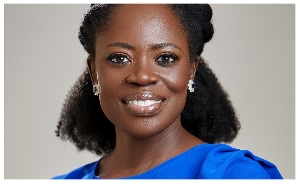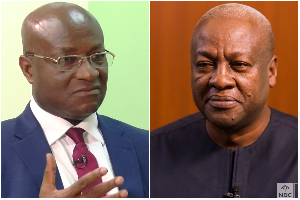The value of securities listed on the Ghana Stock Exchange (GSE) has soared past the GH¢400billion mark, equivalent to approximately US$27billion according to latest data from the bourse.
Consequently, market capitalisation represents around 39 percent of GDP as of March 2024 – which was GH¢1.05trillion.
The breakdown shows equities listed on the GSE were valued at GH¢84billion, while the larger fixed income market came in at a substantial GH¢328billion. However, corporate issuances made up just a meagre 0.77 percent of the total value.
In an interview with B&FT on the sidelines of a meeting with media jointly organised by the GSE and Institute of Financial and Economic Journalists (IFEJ), which had as its theme ‘Partnering with the media to develop the equities market’, GSE’s Managing Director, Abena Amoah, described the GH¢400billion milestone as a step in the right direction.
She was however quick to acknowledge the need for much more growth, especially with the global market.
“It is a step in the right direction, but we know that it should be more – especially in dollar terms as we seek to reach a global audience,” Madam Amoah stated.
The MD’s statements reflect a broader reality across African stock markets. According to the African Stock Exchanges Focus Report by Oxford Business Group, African exchanges have an overall market capitalisation of about US1.6trillion, accounting for just 2 percent of global stock market capitalisation. The Africa Stock Exchanges Association (ASEA) has 28 member bourses covering 38 countries with over 2,400 listed companies.
The GSE MD further stressed the importance of building a strong private capital market in Ghana.
“If indeed the private sector is the engine of growth, we should see more private participation,” she added.
“It is always the biggest market because government is huge. But we need to make sure that the private sector is actively participating in the fixed income market as well,” she said in acknowledgment of the public sector’s dominance.
On efforts to attract more companies to list through IPOs, Ms. Amoah said: “I think one of our biggest challenges today is having more credible companies come to the market and raise capital. We are seeing many investors with funds. How can they invest it? Where can they invest it? Investors gain confidence when strong and well-performing companies come to the market”.
She cited examples of state-owned enterprises (SOEs) and private firms with “good financials, strong management” that should consider listing to raise equity or debt capital from institutions like pension funds and high net worth individuals.
“That’s why we are working with the Mineral Income Investment Fund (MIIF) to launch new products like a gold-backed ETF. We are talking to issuers in sectors like real estate to launch real estate investment trusts, giving people access to diversified investment options,” Ms. Amoah explained.
The GSE is also launching an over-the-counter (OTC) market targetted at over 100 public unlisted companies in Ghana. Amoah said: “Their shareholders don’t know the share price, how to buy or sell securities. The OTC market gives them that transparency and avenue to trade”.
She added that it could also enable these firms to raise capital more efficiently if needed.
Regarding the GSE Alternative Market (GAX) for SMEs, where only Intravenous Products Ltd. trades actively, Ms. Amoah said more issuer engagement is required. “When you engage with investors, share your strategy and plans, you engender confidence that gives them appetite for your securities.”
Tax incentives could also help attract SMEs, Ms. Amoah suggested, citing Jamaica where over 50 companies listed quickly due to corporate tax holidays for new issuers.
“We are in discussions for some of these incentives in Ghana. If we say the private sector is the engine of growth, and their biggest challenge is access to affordable capital, we need to create incentives linking our US$50billion pension funds with SMEs needing growth financing,” she stated.
“If we have this cohesive capital markets approach – investors, issuers, the private sector working together – the economic growth we are looking for will happen.”
The OTC market is expected to be launched at end-June 2024, further boosting options for investors and companies seeking to raise capital in Ghana.
Business News of Thursday, 6 June 2024
Source: thebftonline.com

















